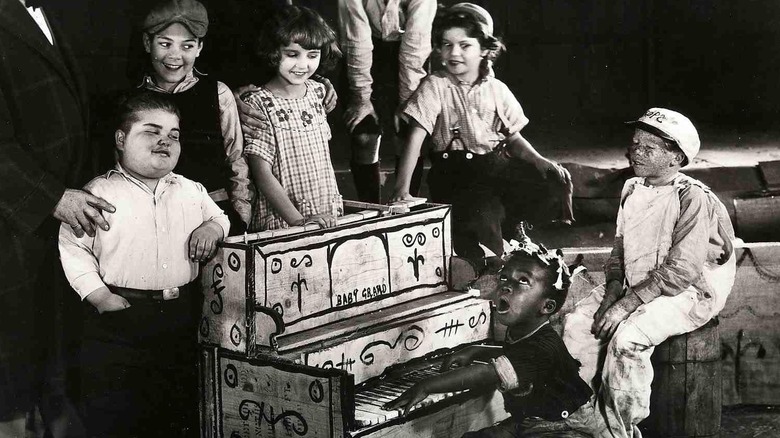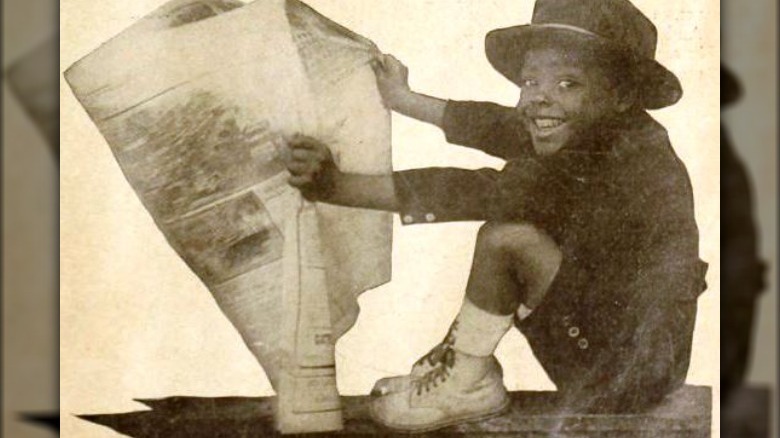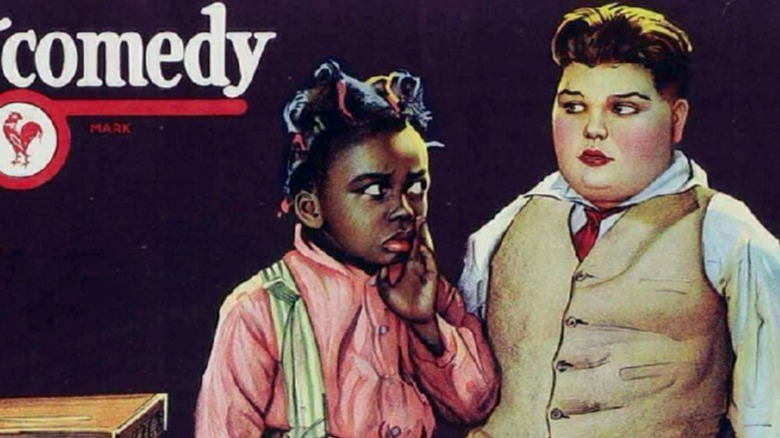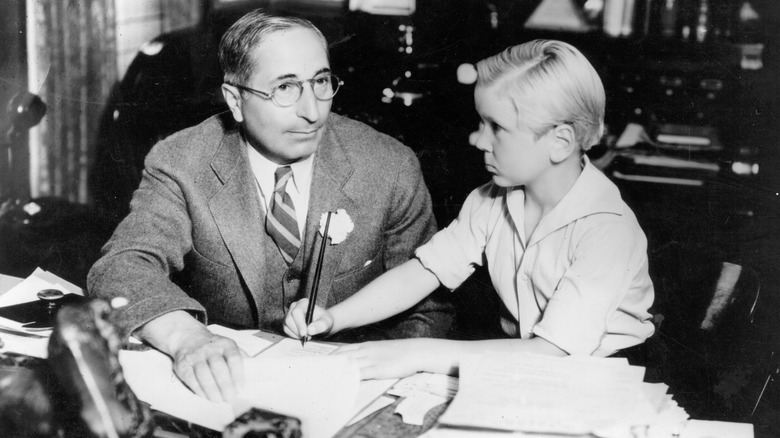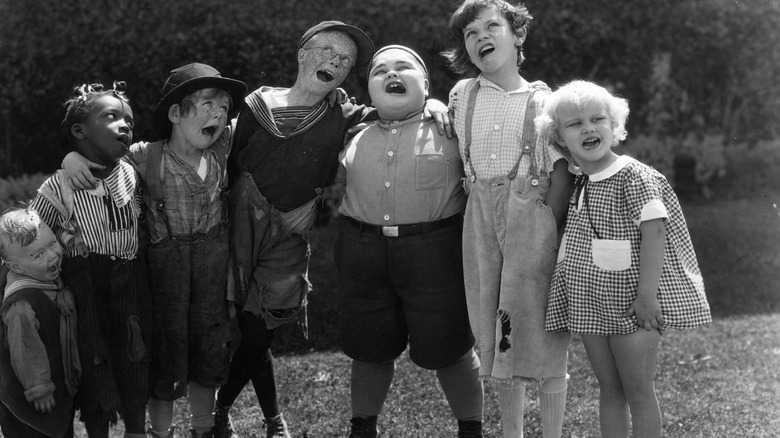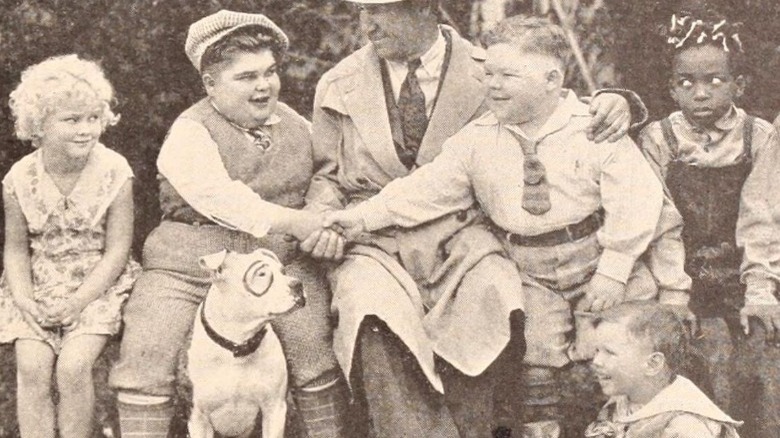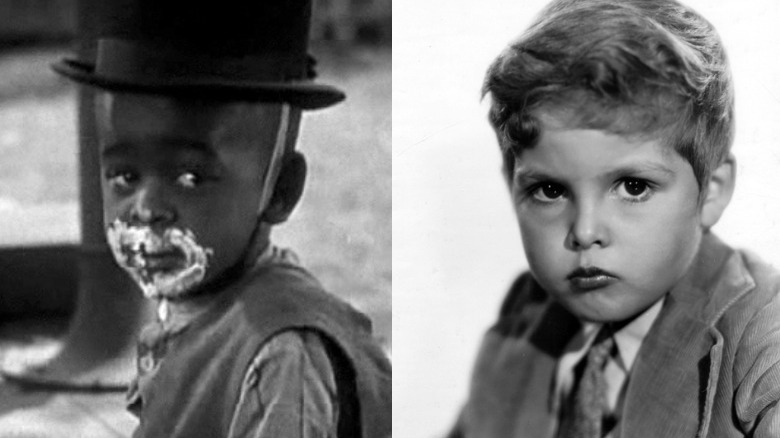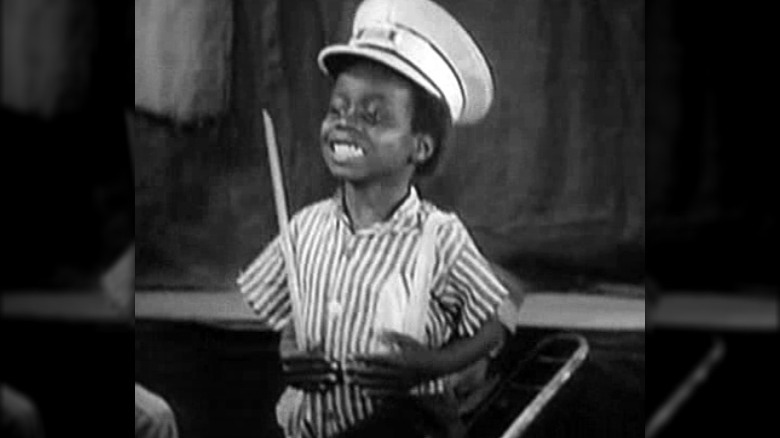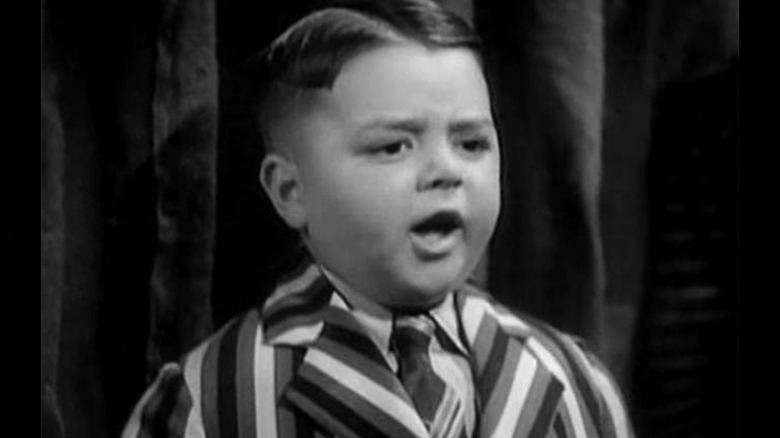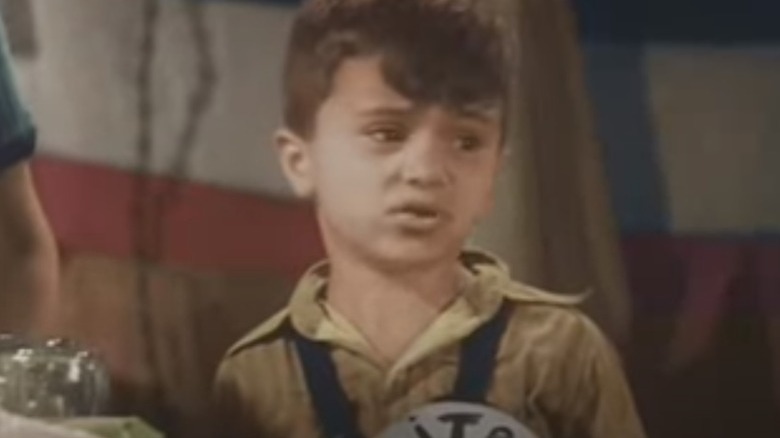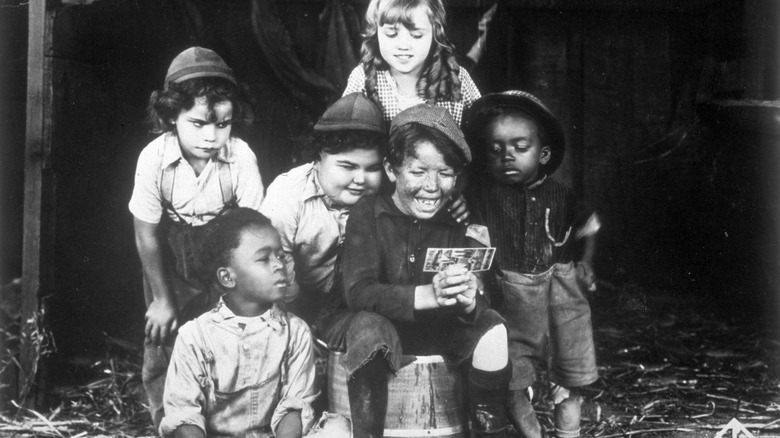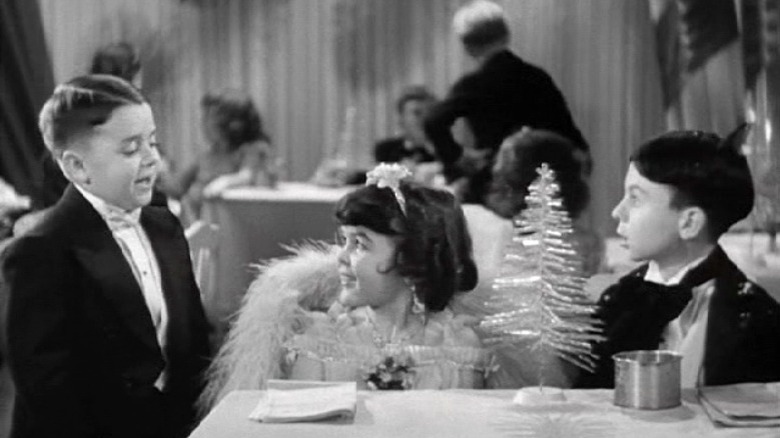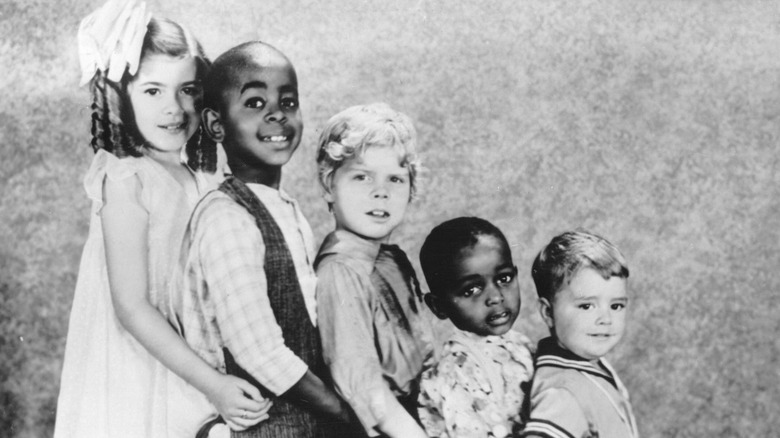The Untold Truth Of The Little Rascals
For many, looking back on childhood comes with a certain amount of nostalgia, especially for those who were raised in the good ol' days before constant connectivity and cyber-bullying. Those were the days of in-your-face bullying, when there was nothing better than that sweet, sweet moment where that jerk got exactly what was coming to them. It's no wonder, then, that "The Little Rascals" have managed such long-term success: There's something great about sitting down to watch the shenanigans of kids just being kids.
"The Little Rascals" was the brainchild of Hal Roach, who originally called the shorts "Our Gang." When he first started making the shorts way back in 1921, they were shown in theaters ahead of the main picture. They were such a wild success that according to Zocalo, they eventually made the jump to television, and became "The Little Rascals."
By the time "The Little Rascals" run came to an end, 23 years had passed and 220 films had been made. Even as the Rascals themselves grew up, generations of viewers continued to be entertained by the antics of the kids that were — at the end of the day — pretty ordinary kids. Here's what even the most devoted fan might not know.
The Little Rascals was built around one kid
The idea behind first "Our Gang" and then "The Little Rascals" was that Hal Roach wanted to produce a series that showed kids just being kids. Julia Lee, historian and author of "Our Gang: A Racial History of "The Little Rascals" says (via KNPR) that it absolutely worked.
The Los Angeles Times says it started with one kid: Frederic Ernest "Sunshine Sammy" Morrison. The New Orleans-born Morrison started out in a series of films called the Baby Marie Osbourne series, and quickly earned his "Sunshine Sammy" nickname for his big smile and easygoing personality. Roach had originally planned on giving him his own series, but "The Sunshine Sammy Series" fell through pretty quickly. The idea stuck, though, and it's thought that Roach took the concept and expanded it into the Rascals — with some credit going to his wife, who was so impressed with Morrison that she told her husband he needed to get him under contract. The then 7-year-old Morrison did sign, and it's thought to be the first long-term contract given to a Black actor.
Even after he aged out of "The Little Rascals," Morrison continued to act, perform on stage, and was a headliner for countless vaudeville tours, says NOLA. He entertained troops in the Pacific during WWII, and ultimately retired from show business. He passed away in 1989, at 76 years old.
It was considered both progressive and extremely racist
The 13th Amendment abolished slavery in 1865, and almost immediately following that was Jim Crow, a series of laws designed to keep what many viewed as the status quo. That meant when "The Little Rascals" made it to the big screen, the idea of a group of friends that included both Black and white children was revolutionary.
Julia Lee took a deep dive into the racial backdrop of the show for her book "Our Gang: A Racial History of 'The Little Rascals.'" Given the climate in the U.S. at the time and the fact that "Our Gang" premiered amid the surging popularity of the KKK and race riots, it's shocking that a diverse cast made it to the screen. She credits producer Hal Roach for that, saying (via KNPR): "He wasn't making a political statement. ... But he was also unconventional and didn't think that there was anything wrong with Black and white children playing together."
That said, it's easy to see why some of it's incredibly uncomfortable to 21st-century eyes. Lee says yes, "The Little Rascals" is filled with characters depicting painful stereotypes, but she explains that context is everything. "Our Gang" was seen on movie screens just a few years after "Birth of a Nation" was, and even though characters were now-offensive stereotypes, it was — at the time — seen as a more favorable depiction of Black characters.
Jackie Cooper's lost childhood
When Jackie Cooper passed away in 2011, the world mourned the loss of the Superman film's Perry White. Less well known was the fact that he had been one of "The Little Rascals." His obituary in The Guardian says that the young Cooper was known for his ability to cry on command, but it didn't come from a good place. He would write that those tears came courtesy of director Norman Taurog, who — needing to make him cry for a 1931 film — threatened to shoot his dog if he didn't turn on the tears.
For "Our Gang," though, Cooper was called "the little tough guy," and unlike many of the kids who came and went through the "Rascals" roster, Cooper stayed in show business. (Which wasn't entirely surprising, as his father was a studio production manager, and his uncle was the director that threatened to shoot his dog. He's pictured signing his contract with MGM.)
Still, when he wrote his autobiography in 1981, it was clear that he hadn't been in love with being a child star. He wrote: "no amount of rationalization, no excuses, can make up for what a kid loses — what I lost — when a normal childhood is abandoned for an early movie career."
It worked because it was kids being kids
Julia Lee, historian and author of "Our Gang: A Racial History of "The Little Rascals" says (via KNPR) that "Our Gang" and early "The Little Rascals" features worked because for the most part, all the kids got along and they were just having fun. Some of the kids have spoken out about their experiences on set, and it's clear some had the time of their lives. Dorothy DeBorba played Echo in dozens of episodes, and told the Tampa Bay Times, "There were so many pleasant memories. ... It was like we had the biggest playhouse in the world. We were always playing, when we weren't working or going to school."
Others have spoken about the friendships they made while filming. When Gordon Lee — who played Porky, before growing up and becoming a history teacher — passed away in 2005, his obituary in the Los Angeles Times paid tribute to the fact that he and Buckwheat actor Billie Thomas were friends both on- and off-camera. Sadly, after filming stopped, the two went their separate ways: According to The Guardian, they never met in adulthood.
Shirley Jean Rickert had other memories. Her mother had her interview for "Our Gang" when she was 4, and she's spoken (via the Los Angeles Times) about how acting was her mother's dream, not hers. "We had fun," she recalled. "The mothers, on the other hand, were awful. Stage mothers are just vile women, including my own."
Petey the Pup had a tragic end
No gang of friends is complete without a dog, and for "The Little Rascals," that was Petey. Originally, Petey was portrayed by a pit bull named Pal and, according to CBS News, that distinctive circle around his eye? (And the eye of every other dog who has stepped into Petey's shoes?) That was actually a naturally-occurring marking on Pal, one that was completed and accented with makeup. Watch reruns of "The Little Rascals," and eagle-eyed viewers will notice that the side of the spot switches, and it's for a heartbreaking reason.
Dr. Annette Bockenek is a Golden Age of Hollywood scholar, film series host, and president of Chicago's TCM Backlot. She says (via Hometowns to Hollywood) that Pal got his start in stardom as a 6-month-old pup, and he was both a massive star and the beloved family pet of trainer Harry Lucenay. Just what happened to Pal is the worst nightmare of all dog-lovers: In 1930, he passed away after being poisoned.
"The Little Rascals" was still going strong, and the gang needed their Petey. Fortunately, there was another dog ready and waiting to step into Pal's place, and that was his son, Peter. Makeup artists drew the distinctive circle around Peter's opposite eye, in tribute to his much-loved father.
A real-life friendship broke the color line
When historian and writer Julia Lee took a deep dive into the racial history of "The Little Rascals," she found one real-life friendship that stood out. Matthew Beard — who always went by his character's name, Stymie — was the smart, wise-cracking, trouble-maker who could get the better of anyone, while Dickie Moore was the spoiled little rich kid. They were opposites on-screen, and the best of friends in real life. Lee found (via Zocalo) that they often hung out when they weren't filming: Moore would write about going over to Stymie's house, sharing ice cream, and playing outside. Stymie visited Moore's home, too, when they would get into all kinds of "Little Rascals" shenanigans. Moore explained: "Of all the kids in pictures, Stymie was my best friend."
There's a footnote to this, and it's that adults ruin everything. Both boys lived in LA, but Stymie lived in the east, Moore in the west. They needed to cross a literal color line to get together, and Moore once remembered Stymie's mother dropping him off, and parking down the street to do it. When Mr. Moore asked why, she explained: "We didn't want your neighbors thinking you go around with colored folks."
The two boys lost touch post-Rascals but reunited 50 years later. Their friendship hadn't waned.
The Little Rascals imposters
There were a lot of rascals over the years, so it's not surprising that it's tough to remember everyone's names. The weird thing is, though, there's a slew of stories about imposters. In 1990, the news show "20/20" had to issue a huge apology (via the Associated Press). They had done a segment on "Little Rascals" favorite Buckwheat, claiming that they'd found him working at a grocery store in Arizona. The problem? The real Buckwheat — Billie Thomas, pictured — had died in 1980, after suffering a heart attack. Thomas' family was understandably outraged.
Also speaking out about the imposter getting some serious cred was George McFarland, who's better known as Spanky. He, too, said he had been targeted by imposters, like a woman named Sally Bowers. Bowers, reported The Washington Post, died in 1987, after convincing everyone she knew that she had been Spanky. She dressed like the character, told stories about filming, and spent at least 40 years claiming she had been hired by Roach after cutting her hair and dressing as a boy. It was, of course, not true in the least.
In 2008, the Decatur Daily reported on the death of Mollie Brown, who claimed to have played Darla. The report was quick to stress that although she had been a vaudeville performer from the era, there was only one Darla — and her real name was Darla Hood.
Spanky sued a lot of people
George McFarland played "The Little Rascals" fan favorite Spanky, and fun fact: He headed the only feature-length film the group ever made, a movie called "General Spanky." McFarland passed away in 1993, and according to his obituary in the Los Angeles Times, he had some conflicted feelings about his time in the Rascals. He was quoted as saying, "I wouldn't take a million dollars for the experience, and I wouldn't take a penny to do it again. If I knew then what I know now, I wouldn't have done it."
Still, McFarland was fiercely protective of his image as Spanky and filed several lawsuits to protect it. In 1990, the Associated Press reported that McFarland was suing a St. Paul, Minnesota bar called Spanky's Saloon. Again. The initial lawsuit did rule that the bar needed to change the name and get rid of the distinctly Spanky-like cartoon logo, along with all the merchandise. McFarland kept at it, though, saying that he was owed around $100,000 in damages.
There was another lawsuit in progress when he passed away, and according to Desert News, this one was filed against a New Jersey venue called Spanky McFarland's Restaurant. Although the suit was initially dismissed, McFarland refiled and a federal court sided with him — even though the restaurant had already closed, and McFarland's death meant the name and image of his iconic character was fair game ... in New Jersey, at least.
One Little Rascal was accused of killing his wife
Robert Blake was a massive star during the 1970s. Best known for "Baretta," he was in the headlines again in 2001, for a completely different reason. According to Biography, Blake had married Bonnie Lee Bakley in 2000, and in 2001, she was sitting in the car outside of the restaurant they'd just eaten at when she was shot and killed. The trial was shocking stuff, with accusations thrown about from all sides. It wasn't until March of 2005 that History reported Blake had been officially acquitted of the murder. Eight months later, however, a civil court found him liable for her death.
What does this have to do with "The Little Rascals"? Blake's birth name was Michael Gubitosi, and he was born into a vaudeville family. In 1939 and 1940, he played an "Our Gang" character called Mickey.
After his civil trial came to an end — and he was ordered to pay Bakley's children $30 million — one of his co-stars came out in his defense. Tommy Bond played the bully, Butch, to Blake's Mickey, and said (via ABC News): "He told me outright, 'I didn't do it,' and he thinks the police are after him. ... Bobby is a mixed-up guy. He's very emotional and keeps things to himself, but to me, he was not the kind of guy to be a murderer."
The Little Rascals curse?
It's a bit of internet wisdom that the kids who starred in "Our Gang" and "The Little Rascals" were cursed. Right? The tragic fates of many of the "Little Rascals" actors are often cited as proof that this one's definitely true, and yes, there are some heartbreaking stories. The Vintage News talks about child stars like Norman "Chubby" Chaney, who died of a heart condition when he was 21; Billy "Froggy" Laughlin, who was riding a scooter when he was hit by a car and killed; and Alfalfa's brother, Harold "Slim" Switzer, who took his own life at the age of 42.
That's all awful, but when Snopes took a look at whether or not there was something fishy going on here, they found that there actually wasn't. There were so many people cast in "Our Gang" and "The Little Rascals" that there was bound to be some tragedy — and that tragedy is not statistically significant.
Others lived perfectly long, ordinary lives: Sunshine Sammy Morrison ended up working in the aerospace industry and died of cancer when he was 76. Strangely, Joe Cobb ended up in the aerospace field, too. He lived to 85. John H. Davis — Jackie — became a doctor, and died at 78. Other long-lived Rascals include Andy Samuel, John Morey Downs, Dickie Moore, Jean Darling, Mary Ann Jackson, Jackie Cooper, Dorothy DeBorba, Gerry Tucker, and Tommy Bond. Simply put? A few tragic deaths are to be expected.
Alfalfa suffered a tragic death
With his big cowlick and his even bigger personality, Alfalfa was a long-time fan favorite. His is also one of the tragic stories often associated with the so-called curse. Film Daily says that Carl Switzer spent five years portraying Alfalfa, and when he aged out, he had every intention of continuing his career in show business. That didn't happen, and he found himself working any and all odd jobs he could find in order to make ends meet.
In early 1959, one of those odd jobs involved agreeing to train the hunting dog of a man named Moses Stiltz. He was in the process of doing exactly that when the dog took off, and desperate, he offered a reward. The dog was returned, Switzer ended up paying up, then decided to go to Stiltz to try to get his reward money back. The two men got into a fight, and Switzer was shot by a Stiltz who later claimed he had fired in self-defense. Switzer was dead when he arrived at the hospital, and a jury later sided with Stiltz's story.
There are two footnotes to this. One: It wasn't until 2001 that a witness came forward to say that the self-defense claim was completely bogus, and Stiltz had killed Alfalfa just because. And two: History says that for as successful as the show was, Switzer never received a dime in royalties.
The deaths of the last Little Rascals
When Jack Hanlon died in 2012, he was 96 years old — and according to Variety (via Today), he had been the oldest living person from the series that was still alive at the time of his passing.
Then, in 2015, two of the last surviving rascals passed away very close to each other. On Sept. 8, the Los Angeles Times reported that 93-year-old Jean Darling had passed away after a sudden illness. Cast in "Our Gang" at just 4 years old, she played Baby Jean — and when she wasn't a baby anymore, she starred in stage and children's productions, and wrote.
On September 11, the Los Angeles Times reported that 89-year-old Dickie Moore had passed away several days prior from natural causes. Those who remembered him looked back fondly on the actor who had been a leading man from his first role at just 11 months old. Moore had written and spoken candidly about what it was like to be the family breadwinner at such a young age, once writing about the life of a child star: "All of us shared common lives, huge responsibilities, and salaries that shriveled fathers' egos." Moore's bankability faded as he aged through his teen years, and he was fine with that, writing that he came to hate being in the spotlight.
